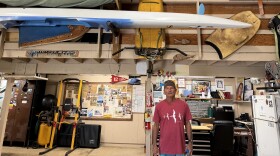The Transportation Security Administration wants to remind travelers about some of its relatively new technology at Oʻahu's Daniel K. Inouye International Airport.
The new technology comes at a time when the agency said it is preparing to roll out more upgraded features at TSA checkpoints, including at the Honolulu airport.
“I think what people need to know is that some of these technologies have been in place for two or three years. But the number of units we have is expanding, or the amount of time we're using them, or the fact that they're the primary way that we perform that function,” said Lorie Dankers, a TSA spokesperson.
She highlighted Credential Authentication Technology, or CAT, units and their more modern CAT-2 units that are being used at the airport.
Travelers only need to present their photo IDs, not their boarding passes, to TSA agents to pass through the checkpoint.
The units confirm the traveler’s identity and can check if they have an upcoming flight.
The CAT-2 unit is similar but takes photos of travelers to confirm their identity. Dankers confirmed that the units don’t have a way to store the images.

Most of the checkpoints at the Honolulu airport use one of the CAT units.
They are supposed to be a more secure and speedier way to get passengers through security. Approximately 25,000 people travel through the Honolulu airport every day, according to the TSA.
California resident Erik Peterson passed a security checkpoint with a CAT unit on his way to Maui. He said his line was faster than the others.
“I think it was like 10:38 when we hopped in line and it's 10:58 now. So, it was pretty quick. We were looking at the three lines and actually (this line) … seemed to be moving the fastest,” he said.
At one of the lanes, TSA uses Computed Tomography (CT) technology, or a CT X-ray scanner like those used in medical settings.

The scanner takes 3D images of carry-on bags instead of 2D ones like older scanners used to do.
The upgrade to security is supposed to be faster than before because travelers don’t have to remove electronics or travel-sized liquids from their bags.
While there’s only one at the airport, more will be rolling out in the future, airport officials said.
There are also older forms of security that the TSA is still using. In Honolulu, travelers shouldn’t be surprised to see 5-year-old Xaira, a German Shepherd trained to sniff travelers’ bags for explosives at TSA lines.
Travelers in standard boarding pass lanes should also still expect to have to remove their shoes at the TSA lines — a requirement that officials don't anticipate will go away anytime soon.
“We hear that a lot from travelers about leaving on your shoes. The solution right now is to enroll in TSA PreCheck as a vetted and trusted traveler, and you'll be able to go ahead and leave your shoes on. That would be my travel hack for you at this point,” Dankers said.





